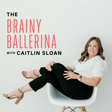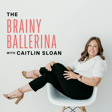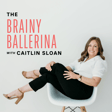
23. A Holistic Approach to Strength Training with Wendy Reinert
Wendy Reinert is a retired professional dancer, aerialist, strength coach, life coach, world traveler, amateur rock climber and toddler mom. Wendy is the founder of Being a Dancer, a platform dedicated to helping dancers navigate the emotional challenges of the dance industry. Her mission is to make the dance world easier and healthier AND to give dancers the tools they need to advocate for and take care of themselves mentally and physically.
Wendy is a wealth of knowledge - our conversation ranged from finding your unique career path based on your values to the importance of strength training for dancers. Her approach is so holistic and always comes back to the human inside the dancer. As you can probably tell, Wendy totally speaks my language and I loved having her on the podcast!
Key Moments:
- Early dance training [2:10]
- What led her to attending college for dance at NYU Tisch [5:28]
- Wendy’s advice to help you figure out what’s right for you as a dancer [9:21]
- Wendy’s transition from student to professional [17:56]
- How Wendy sustained a professional freelance dance career for 20 years [22:19]
- The injuries that jump-started her work as a personal trainer [24:59]
- What dancers need to know about strength training and where they can get started [28:26]
- How dancers can incorporate strength training into their routine [36:10]
- The biggest challenges dancers are currently facing [38:49]
- Her biggest piece of advice for dancers pursuing a career [45:35]
Connect with Wendy:
WENDY’S WEBSITE: Wendyreinert.com
ON BEING A DANCER: Beingadancer.com
INSTAGRAM: https://instagram.com/onbeingadancer
Links and Resources:
Get your copy of The Intentional Career Handbook
Get your copy of The Ultimate Audition Guide
Let’s connect!
My WEBSITE: thebrainyballerina.com
INSTAGRAM: instagram.com/thebrainyballerina
1-1 CAREER MENTORING: book your complimentary career call
Questions/comments? Email me at caitlin@thebrainyballerina.com


